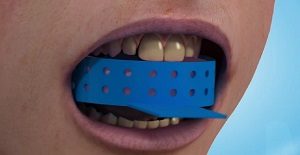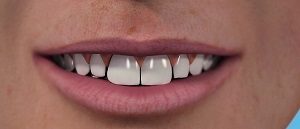Teeth can appear duller for a number of reasons, such as diet, ageing, certain medications, smoking and trauma. Teeth whitening is a gentle chemical process used to eliminate discolouration and lighten teeth, giving you a noticeably brighter and more youthful looking smile.
External whitening
This involves applying a bleaching agent to the outer surface of the tooth in the following ways:
Home whitening
- Impressions are taken of your teeth so customised whitening trays can be produced to fit comfortably and securely.
- When ready, you will wear these at home with a bleaching gel for a specified length of time each day.
- After completing the treatment, which will take a few weeks, you will attend a follow-up appointment to check your teeth have been successfully lightened.
Professional home whitening treatment is a superior alternative to kits that can be bought over-the-counter because the mouth trays are designed to be a perfect fit, which allows the active gel to work more effectively. The bleaching agent is also stronger and offers enhanced lightening power.
We recommend you use our home whitening kits as, not only are they more effective, they also allow us to keep a close eye on your teeth and help avoid side effects such as gum irritation and tooth sensitivity.
In-surgery whitening
This is also known as ‘laser’ or ‘power’ whitening and involves applying a whitening gel to your teeth and using a bright light to speed up the process. It is a much quicker procedure, taking under two hours, and ideal for those who are looking for fast results.
Internal whitening
This involves placing a whitening agent inside a discoloured tooth that has had root canal therapy, which means the inner part of the tooth (the ‘pulp’) has been removed and replaced with a rubber filling.
- The lightening product is inserted into a drilled hole which is then sealed with a temporary filling.
- About a week later, the filling and the bleach are removed and, if necessary, the process is repeated. When the ideal shade is achieved, the hole is permanently sealed with a tooth coloured filling.
Teeth whitening will only work on natural teeth and will not be effective on replacement ‘false’ teeth such as crowns, veneers or dentures. However, they can be replaced to match newly whitened teeth.
Aftercare
You can help maintain the whiteness of your teeth by avoiding food and drink that may cause staining, and brushing your teeth at least twice a day.
Teeth whitening does not give permanent results but home whitening trays can be reused if a top-up is necessary.
What does tooth whitening do?
Tooth whitening can be a highly effective, yet very simple way, of lightening the colour of teeth without removing any of the tooth surface. It cannot make a colour change, but lightens the existing colour.
What does the procedure involve?
In a live tooth the dentist applies the whitening product using a specially made tray which fits into t he mouth like a gum shield. The chemical is then activated using heat, or heat and light combined. The active ingredient in the product is normally hydrogen peroxide or carbamide peroxide.
he mouth like a gum shield. The chemical is then activated using heat, or heat and light combined. The active ingredient in the product is normally hydrogen peroxide or carbamide peroxide.
If the tooth has been root treated, the canal, which previously contained the nerve, may be reopened and the whitening product is put in.
In both cases, the procedure needs to be repeated until the right shade is reached.
How long does the procedure take?
First of all you will need 2 or 3 visits to your dentist. Your dentist will need to make a mouthguard and will need to take impressions for this at the first appointment. Once your dentist has started the treatment, you will have to continue the treatment at home. This will mean applying the bleach regularly over 2-4 weeks for 30 minutes to 1 hour at a time.
However, some newer products can be applied for up to 8 hours at a time, which means that a satisfactory result can be obtained in as little as 1 week.
Why would my teeth need to be bleached?
Everyone is different; and just as our hair and skin colour varies, so do our teeth. Some teeth have a yellowish tinge, some are more beige – very few are actually ‘white’. Teeth also yellow with age can become stained on the surface by food and drinks such as tea, coffee and blackcurrant. Calculus (tartar) can also affect the colour of the teeth. Some people may have staining inside their teeth. This can be caused by certain antibiotics or tiny cracks in the teeth, which take up the stain.
Will I be happy with the results?
Treatment results may vary depending on the original shade of the teeth. Teeth will tend to dar ken slightly over time. The effect lasts for around 1 to 3 years, although sometimes it can last longer. Some people find that their teeth are sensitive for the first few days after treatment, but this wears off after a short while.
ken slightly over time. The effect lasts for around 1 to 3 years, although sometimes it can last longer. Some people find that their teeth are sensitive for the first few days after treatment, but this wears off after a short while.
What about home kits?
Over-the-counter kits are not recommended as they contain only a small amount of hydrogen peroxide which makes the product less effective. Some also contain mild acids, while others are abrasive. Although these products are cheaper, whitening is a complicated treatment procedure and should only be carried out by a dentist after a thorough examination and assessment of your teeth. It is very important to follow the instructions your dentist gives you, and to make sure that you go for any follow-up appointments recommended.
When might whitening not work?
Whitening can only lighten your existing tooth colour. For a change to specific chosen shade veneering is another option. Whitening also works on natural teeth. It will not work on any type of ‘false’ teeth. This includes dentures, crowns and veneers. If dentures are stained or discoloured, it may be worth visiting the dentist and asking him or her to clean them. Stained veneers, crowns and dentures may need replacing. Again, ask your dentist.
What about whitening toothpaste?
There are now several whitening toothpastes you can buy. Although they do not affect the natural colour of the tooth, they are effective at removing staining and therefore improving the overall appearance of the tooth. Whitening toothpaste may also help to keep up the appearance, once teeth have been professionally whitened.
